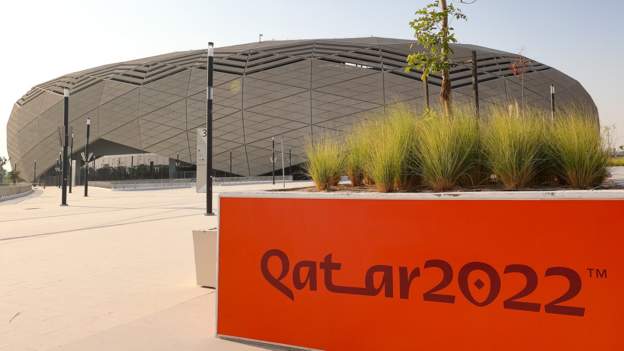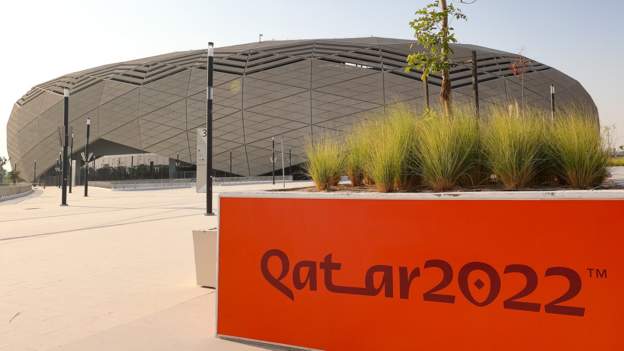
Qatar World Cup: Security guards made to do ‘forced labour’ – Amnesty

Security guards in Qatar working on projects that include some linked to the 2022 World Cup have been subjected to conditions “which amount to forced labour,” claims Amnesty.
In a new report published just days after the official draw for the tournament, the human rights organisation documented the experiences of 34 employees from eight private security companies.
It said the migrant workers described working for months or even years on end without a day off.
Most said their employers refused to respect the weekly rest day which is required by Qatari law, and workers who took their day off faced being punished with arbitrary wage deductions.
Amnesty says the workers were employed by private companies which provided services for sites including football stadiums, as well as other infrastructure projects essential for the World Cup.
At least three of the companies provided security for recent Fifa tournaments in Qatar, including the 2020 Club World Cup and the 2021 Fifa Arab Cup.
Amnesty said that while Fifa and World Cup organisers the Supreme Committee for Delivery and Legacy (SC) did not renew the contracts of two of the three companies, “neither body provided sufficient detail to assess whether this disengagement was carried out responsibly, transparently and as a last resort”.
“They compounded this failing by not identifying and addressing abuses in a timely manner,” said Amnesty.
In a statement, the SC said: “Unfortunately, three companies were found to be non-compliant across a number of areas during the 2020 Club World Cup and 2021 Arab Cup.
“These violations were completely unacceptable and led to a range of measures being enforced, including placing contractors on a watch-list or black-list to avoid them working on future projects – including the Fifa World Cup – before reporting [them] to the Ministry of Labour.”
Amnesty said one hotel security worker it spoke to, from Kenya, often went months without a single day off.
Another – Abdul from Bangladesh – said “he did not have a day off for three years”.
Qatari law restricts weekly working hours to a 60-hour maximum, including overtime, with workers entitled to one full, paid rest day each week.
But Amnesty claimed 29 of the 34 security guards they spoke to said they regularly worked 12 hours a day, and 28 said they were routinely denied a day off, meaning many worked 84 hours per week, for weeks on end.
‘Abuses are systemic’
Amnesty interviewed the current or former security guards, supervisors and safety officers between April 2021 and February 2022 and claims the consistency of the accounts across multiple companies “indicates that these abuses are systemic”.
Stephen Cockburn, Amnesty International’s Head of Economic and Social Justice, said: “Despite the progress Qatar has made in recent years, our research suggests that abuses in the private security sector – which will be increasingly in demand during the World Cup – remain systematic and structural.
“With the World Cup just months away, Fifa must focus on doing more to prevent abuses in the inherently perilous private security sector, or see the tournament further marred by abuse, [and] use its leverage to pressure Qatar to better implement its reforms and enforce its laws. Time is fast running out.”
In response, the SC said that since 2014 it “has been committed to protecting the health, safety and security of any worker engaged on official World Cup projects”.
It added: “Our entire programme of work – which began in the construction industry and has since evolved into the hospitality sector – is governed by our contractually-binding Workers’ Welfare Standards, which are diligently monitored and enforced.
“The scale of the SC’s programme, which is unique even by international standards, will always have contractors attempting to beat the system, regardless of stringent regulations or monitoring.
“We are committed to addressing and rectifying any breach of our standards through our enforcement mechanisms, and where appropriate, doing so collaboratively with contractors and stakeholders.”
The SC said that as a result of workers’ welfare inspections, 391 contractors have been reported to the Ministry of Labour, 50 have been blocked from its projects, seven have been blacklisted, and workers have had millions of pounds in recruitment fees reimbursed.
In a statement, Fifa said it “does not accept any abuse of workers by companies involved in the preparation and delivery of the World Cup”.
It added: “Following inspections during the Club World Cup and Arab Cup, contractors that failed to comply with the required standards were identified and the issues found addressed on the spot.”
It also said that it would enforce compliance with the SC’s Workers’ Welfare Standards for more than 150 hotels in Qatar, as well as on pre-contract audits for other service companies at the World Cup, including security companies.
In 2017, Qatar embarked on what Amnesty calls “an encouraging agenda” to tackle labour issues – and has since introduced legal reforms including a new minimum wage, and repealed aspects of the “kafala” system, under which migrant workers are legally bound to their employer and have limited rights.
However, Amnesty claims these reforms “are not being effectively implemented”.
It added, that while “enhanced labour standards have been expanded to cover World Cup service workers… these promises have yet to fully materialise in the security sector”.
Last week, SC secretary-general Hassan Al-Thawadi told the BBC that criticism by players and managers of Qatar’s human rights record has been “ill-informed” and that “actual progress” had been made on worker welfare.
However, player representative organisation Fifpro said “workers continue to be subjected to abusive practices” and that “unscrupulous employers” are “not being held to account”.
